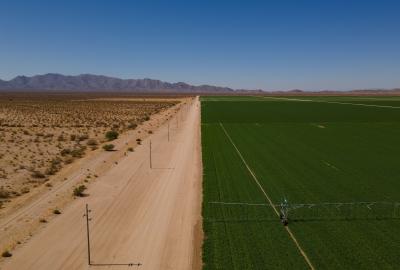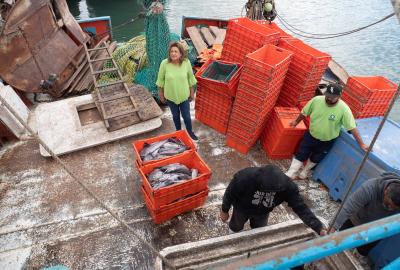Supreme Court takes on bombshell case
The Supreme Court is no stranger to bombshell cases. In recent years, it has taken on reproductive rights, affirmative action, voting rights and much more.

This term the court will decide a case with huge implications for the way the federal government regulates everything from water and air pollution to food safety.
We sat down with Environmental Defense Fund’s General Counsel Vickie Patton to learn how a case about fishing boats could affect the future of environmental protections and how she and her team are preparing to keep fighting.
Why is a case about fishing boats at the Supreme Court?
The case is about who has to pay a monitoring fee to prevent overfishing. The National Marine Fisheries Service says it has the authority to make the boat operators pay. The boat owners, represented by lawyers affiliated with Koch Industries, an industrial conglomerate and major funder of climate denial and deregulation, argue that that goes beyond what the law lays out.
The case has become a vehicle to present a much bigger legal question: When it is not clear how a statute should be carried out, should the courts defer to federal agencies like the National Marine Fisheries Service — or, for that matter, the EPA or FDA — so long as those interpretations are reasonable?
- EPA's new tailpipe rules for cars will deliver cleaner air, tackle climate change
- Toxic chemical under fresh scrutiny a year after East Palestine train crash
- Major oil refinery censured over toxic air
What is at stake?
The Supreme Court’s ruling could reshape the authority of federal agencies to interpret the laws they are tasked to administer. Judges, not experts, would get to call the shots. If the ruling is retroactive, it would also pave the way for industry to revisit thousands of settled cases and unleash chaos in the court system.
We would be living in a world where industry is invited and even encouraged to go to the courts to obstruct progress at every turn.
The ruling could have far reaching and adverse effects on our protections for clean air, clean water, toxic chemical safety and more.
How did we get here?
For 40 years, we’ve relied on a stable legal system where Congress passes laws, knowing that the laws will need to adapt to a changing world, and relying on experts in federal agencies to administer the laws responsibly.
That means the federal agencies must develop rules based in science, listen to public comments and be able to rationally explain decisions. It is a system referred to as the Chevron doctrine or framework. Opponents of federal policies and safeguards have been attempting to weaken or do away with Chevron for some time.
In deciding the issues related to fishing boats, Loper Bright Enterprises v. Raimondo and Relentless, Inc. v. Department of Commerce, the Supreme Court may be about to do just that.
How big of a deal is this?
If the court weakens or overrules Chevron, it would fundamentally change how administrative law operates in this country. It would destabilize the balance of power between the three branches of government, giving more power to judges to make consequential policy decisions based on their own preferences, and taking power away from expert agencies that have the responsibility to administer these laws and are accountable to the President and to elected officials in Congress.
That sounds dire. What gives you hope?

We just enacted the most important climate law in American history. The Inflation Reduction Act of 2022 provides vital and historic new investments in communities and environmental justice. It also strengthens the climate protections under existing laws, like the U.S. Clean Air Act.
The cost of clean energy and transportation is plummeting and the number of new manufacturing jobs in clean technologies is growing at record numbers and growing in parts of the U.S. that have been left behind for far too long. We are making progress and will continue to do so, whatever the court decides.

